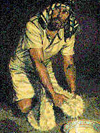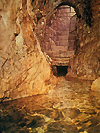|
Gabriel
The English interpretation of the Hebrew name
Gavriel, composed of the words gavri (גברי) and אל (el), i.e.
“Man-like
God”. It refers to the name of the archangel who is characterized as
having pre-existent wisdom that enlightens the whole universe. He
explained the visions of the ram and the he-goat to the prophet Daniel
when he was in exile in Babylon and revealed the birth of John the
Baptist to Zechariah, as well as the birth of Jesus Christ to the Mary.
In Islam it is believed he was the medium through whom God revealed the
Qur'an to Muhammad.


Gavriel (גַּבְרִיאֵל)
Hebrew for
Gabriel.

Garden of Eden
Name of the place where
Adam
and
Eve dwelled after
they were created by God. Its geographical location is related to four
rivers, i.e. the
Pishon,
Gihon,
Tigris and
Euphrates, as well as to
three regions, i.e.
Havilah, Assyria, and
Cush. Those locations however,
remain the subject of controversy and speculation, whilst some see it as
metaphorical. See also
Eden.

George Wishart
A 16th-century Scottish preacher and reformer who
played a prominent role in the early stages of the Scottish Reformation.
Best known for his fervent opposition to the Roman Catholic Church and
his advocacy of Protestant ideals, Wishart became one of the most
influential figures in introducing Reformation thought to Scotland. Born
around 1513, he was the son of James Wyschart, Laird of Pitarrow, and
Elizabeth Learmont. Wishart studied the classics at the University of
Aberdeen and later served as a schoolmaster at the Grammar School in
Montrose, where Greek was first taught in a Scottish school. There, he
began teaching the New Testament in Greek, laying the foundation for his
lifelong engagement with Scripture and theology. Exposed to the emerging
Reformation ideas sweeping across Europe, Wishart embraced doctrines
such as justification by faith and the authority of Scripture over
Church tradition. Around 1538, he began preaching reformist principles
in Scotland, calling for a break from Catholic practices. For this, he
was charged with heresy by the Bishop of Brechin and fled the country,
seeking refuge in Switzerland and Germany, where he came under the
influence of Jean Calvin and his followers. By 1543, Wishart had
returned to England, teaching at Corpus Christi College, University of
Cambridge, before returning to Scotland the following year. His sermons
attracted both enthusiastic followers and fierce opposition from the
Catholic hierarchy. In 1546, while preaching the Protestant faith,
Wishart was betrayed to Cardinal David Beaton, arrested, and imprisoned
in the notorious bottle dungeon of St Andrews Castle. He was tried for
heresy before a court presided over by Cardinal Beaton, condemned, and
burned at the stake on 1 March 1546. His execution provoked widespread
outrage among Protestant sympathizers, and his martyrdom became a
rallying point for reformers throughout the kingdom. Only two months
later, on 29 May 1546, a group of Wishart’s supporters, driven by
vengeance and the growing Protestant fervour, infiltrated St Andrews
Castle, where Cardinal Beaton had taken refuge. They captured and
murdered him in his chamber, displaying his body from the castle
battlements. It is said that within the castle walls, these men formed
the first congregation of what would become the Church of Scotland. The
deaths of George Wishart and Cardinal Beaton marked a decisive turning
point in Scottish religious history. Wishart’s martyrdom and Beaton’s
assassination deepened the divide between Protestants and Catholics and
set in motion events that would culminate in the establishment of
Presbyterianism. Among those profoundly influenced by Wishart was
John Knox, who regarded him not only as
a mentor but also as a close friend. Wishart’s courage, teachings, and
tragic death remain emblematic of the spirit of the Scottish
Reformation—a movement that would forever alter the religious and
political landscape of Scotland.


Gideon (גִּדְעוֹן)
Hebrew. “Cutter down” or “feller”, sometimes
translated as “destroyer” or “mighty warrior”. Name of the youngest son
of Joash of the Abiezrites and the fifth judge of Israel. He was a young
man of faith, who was chosen by God to lead the Israelites against the
Midianites. Unsure of God's command, he requested proof of God's will
twice, by putting some wool on the ground, asking God to overnight put
dew only on the wool, but not on the ground. It happened as he had asked
for, but to reassure himself he did the test once more, this time asking
God for the wool to be dry and the ground to be wet. When this had
happened the next morning, he was certain of God's instructions and
assembled an army. When God saw that this army was too big, He instructed
Gideon to send the majority of the soldiers home, in order that after
the victory, the Israelites would realize that God had saved them and not
their superior numbers or their own doing. He is also also known as Jerub-Baal.


Gihon (גיחון)
1. Hebrew. “Bursting forth”.
Name of one of four rivers mentioned in
Genesis 2:13, along with the
Pishon,
Tigris and
Euphrates. It is
described as a river that branched from a single river within the
Garden of Eden and as “encircling the entire land of Cush”, a name mentioned
elsewhere in the Bible as a brother of Egypt, who is associated with
South Arabia and Mesopotamia, though generally in the Bible, Cush refers
to Nubia. If this is the case here, too, then Pishon and Gihon may be
terms for the Blue Nile and the White Nile. In his Jewish Antiquities,
the Jewish-Roman historian Flavius Josephus also identified the Gihon
with the Nile. In Hebrew, the name is a pun, because in Genesis
3:14, the snake is cursed that it must crawl on its belly, which
in Hebrew is gahon (גָּחוֹן). The root גיח means
“to gush forth”.
2. Name of a spring in a valley
outside of Jerusalem, where the anointing and proclaiming of Solomon as
king took place.

 |